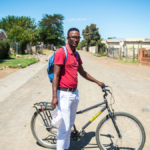© Copyright Bhekisisa Centre for Health Journalism | Privacy Policy | Terms and Conditions | PAIA Manual
Home Search
Africa - search results
If you're not happy with the results, please do another search
Corruption trap: Why healthcare fraud is costing you money
When South Africa’s medical schemes lose R28-billion a year, it puts a dent in your pocket. What could private medical aid funds’ teams who work to get back that money teach the National Health Insurance? Mia Malan talks to Botho Mhozya of Discovery Health in the March edition of Bhekisisa’s monthly TV programme Health Beat.
Should your party save you from floods? Voters think so
: Last week, the south coast of KwaZulu-Natal was mopping up damage after being battered by heavy, unexpected rainfall over the weekend — almost 50 times more in 24 hours than what the usual daily average is here. How seriously should your political party take such issues? Here’s what voters think.
What the corporate climate lobby means for your health
Read the second edition of Climate ConnectionSouth Africa’s energy CEOs say they’re committed to cutting greenhouse gas emissions while keeping the grid going and...
Will the food industry sacrifice its fat profits for health?
South Africa’s growing obesity epidemic won’t be reversed by preaching healthier eating habits and exercise alone; there’s a growing realisation that the food industry needs to change, write David Harrison and Liezel Engelbrecht.
How a rural KZN site is helping the world find a TB jab
A new tuberculosis vaccine is being tested in South Africa as part of a large trial in which about 20 000 people from seven countries will get their shots. We visited a rural site in KwaZulu-Natal to see how it is being rolled out.
[VIDEO] When politicians steal, patients suffer
The National Health Insurance scheme is supposed to provide all South Africans with the healthcare many have fought and died for. But citizens are wary of trusting politicians with the public purse and point to Tembisa Hospital on the East Rand as an example of how money set aside for health, has been used for anything but.
Newsletter signup
Stay informed about the most important health stories in South Africa and the world with Bhekisisa’s newsletters. Learn about the latest developments in health...
‘I’m a smoker — and I want stricter tobacco control’
Civil rights activist Koketso Moeti has been smoking for over 20 years. Yet she supports South Africa’s new Tobacco Bill, which bans indoor smoking, including vaping, in public buildings. Here’s why.
#SliceOfLife: I get R7 for every ARV parcel I deliver to patients on my...
With a fifth of antiretroviral or chronic medication parcels left uncollected in the Chris Hani district in the first three months of this year, bicycle deliveries by Siphelo Lose are a lifeline to people in rural areas who can’t get to clinics. In this #SliceofLife he shares his story.
Health Beat #17 | Why corruption isn’t a victimless crime
In theory, the National Health Insurance (NHI) could transform our failing healthcare system. But, many South Africans have little faith in the politicians who are supposed to look after the public purse. We take a look at how the residents of Tembisa cope with the results of corruption at their hospital, the systems that private medical aid schemes have in place to curb fraud, and how the planned NHI could benefit from being more transparent.
What’s 95% safer than tobacco? Not vapes, say experts
More and more studies are showing that vaping is not harmless and that electronic smokes should be regulated the same way as traditional cigarettes — and governments are getting on board. A lung health expert from the University of Cape Town tells Mia Malan why in the February edition of Health Beat, Bhekisisa’s monthly TV programme.
Why is TB called the ‘disease of paper’ in Eastern Cape villages?
The words we use to describe diseases tell us more about how people experience living with it. The isiXhosa word for tuberculosis, isifo sephepha, is a case in point. Understanding where it comes from can help to break down the stigma around the disease.
Does SA’s biggest killer show up in your party’s manifesto?
A curable and preventable disease is South Africa’s biggest killer. Is your political party going to do something about it — and does it show up in their election manifesto?
Street vendors, vetkoeks and Cokes: ‘The food tastes good and is cheap’
About one in five teens in South Africa are overweight or have obesity, with eating unhealthy foods being a big part of the problem. But changing policies to make cities healthier can help school kids eat better — and set them up for a healthier future. Cape Town is part of a project to do this.
Why 32 000 SAns could die if we don’t switch to greener power earlier
South Africa needs to produce more electricity to end loadshedding. But at the same time we also need to move away from coal-fired power to fight global warming. In this tug-of-war, people who live close to power stations will keep falling ill from breathing in dirty air.
Wake up: Sleeplessness is a public health crisis
When you’re not feeling rested and refreshed after a night’s sleep, your thinking is fuzzy, your reaction time drops and you feel sluggish at work. But more and more research shows that sleeping poorly is a big public health worry. Today, on World Sleep Day, two experts explain why.





![[VIDEO] When politicians steal, patients suffer](https://bhekisisa.org/wp-content/uploads/2024/04/HEALTH-ON-THE-BALLOT-2-150x150.jpg)








